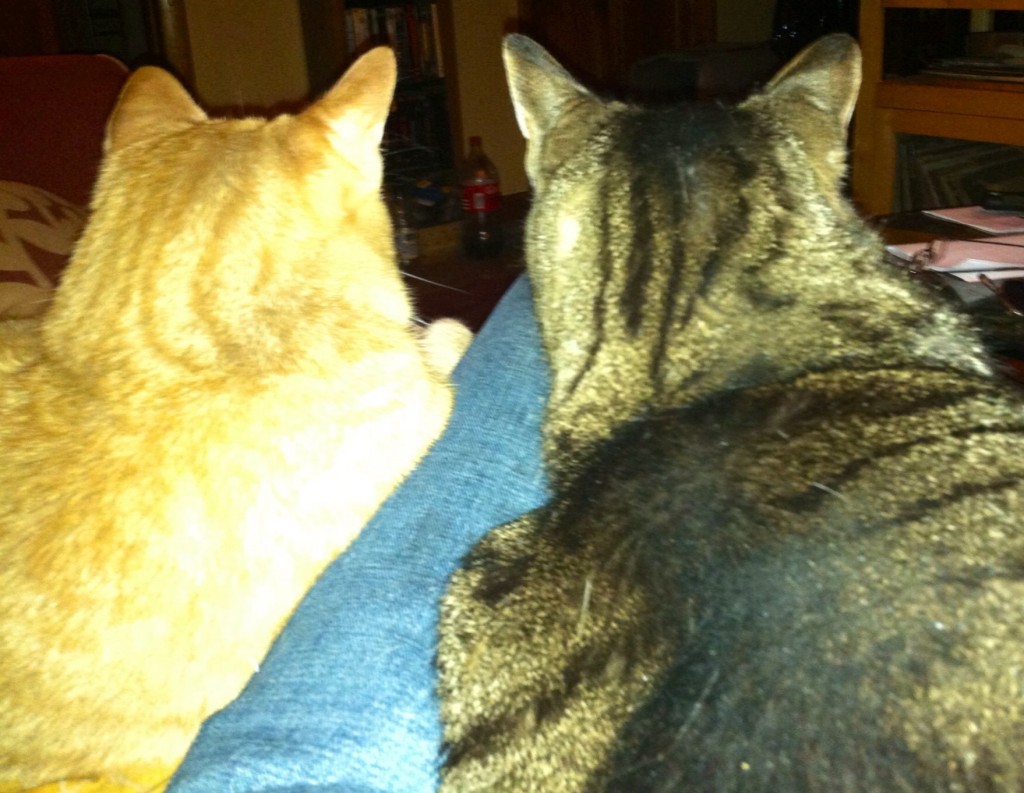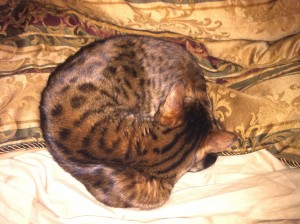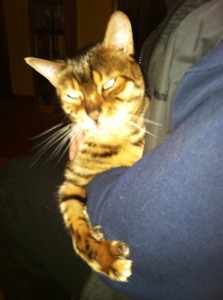
She steals my place on the couch and she walks on me a lot. I put up with it because she’s Molly. I have the inside track on Cheetos too. She lunges before she makes nice. I just look wistful and stricken.
Our own grey, Molly, is fine, so this is not that kind of report. But the people who rescue racing greyhounds after their track days are a community, partly geographical, partly evangelical, and wholly devoted. We frequently know the others in our area who also have greys, and often the others are people who persuaded us to rescue in the first place, while just as often they’re the people we’ve persuaded to follow this unique path.
Why, when one is lost to age or disease, we feel it especially keenly. This happened to us over the weekend. Friends of ours had to put one of theirs down. We know how they feel because we’ve been there. It’s a common end for greys and it’s hardly ever “in the fullness of time.”
The breed is in many ways distinct from all others. They are purebreds who have been massively overbred as livestock in service to a legal, profitable industry, dog racing. All the rescues have birthdate tattoos in their ears, like cattle. Which is how most have been treated since birth through their racing years, raised without human affection or even human interaction.
Indiscriminate breeding of purebreds also leads to multiple genetic predispositions to disease that plague many purebreds but can be guarded against in many breeds by scrupulous breeders. As a result, greyhounds suffer inordinately from cancer. They have, almost all of them, bad teeth. And because of their extreme physical traits, no body fat, incredibly compressed digestive systems and leg bones, they are unusually prone to grievous limb injuries and death by bloating.
My wife and I have had four greyhound rescues. One died of bone cancer, and we were present for the euthanasia. Even the vet wept. One died very suddenly of liver cancer. A third died because we foolishly allowed another vet to remove all but four of his rotten teeth; he declined with extraordinary rapidity, and we will never consent to that treatment again.
Why am I telling you this? The rescue spiel is supposed to begin with the good things and mention the bad as a kind of asterisk or footnote the good hearted need to know. It’s not. It’s part of the deal in virtually every instance.
I’m telling you because it’s all worth it, every bit of it, even if you’re not some kind of determinedly self-sacrificing altruist. Something even we need to remind ourselves of when worse comes to worst.
A rescue acquisition is carried out like some kind of drug deal. Two cars rendezvous in the remote corner of a mall parking lot. The foster parents — the real saints who take them directly from the track and screen them for the small animal aggressiveness that coincides with a predator who runs 45 mph in pursuit of a fake rabbit — pull up in a modest compact car and you exchange tentative greetings, both of you feeling each other out, before they open the rear door and introduce you to the “package,” a full-grown dog who has never had a puppyhood or a human relationship that didn’t end in sudden disappointment.
I remember when we got Andrew, the fosters were apologizing that he might be difficult to extract from their back seat because he was so timid and shy of men in particular. I leaned into the car and grasped his leash. He looked at me and came out of the car immediately. I turned in the direction of our car and he led me to it without a backward glance. I opened the door and he clambered in. He was going home.
Believe me, I’m not presenting myself as a dog whisperer. There’s a spiritual aspect to the greyhound experience. Somehow dogs are supposed to be with human families and they have a sense of this that survives even the most extreme deprivations. I think Andrew just knew that his family had finally come for him, and he’d been waiting for them all this time.
When I was courting my wife, she already had a greyhound named Sonny who was notoriously timid with men. I never saw it. He was like, “Oh, YOU’RE finally here,” and within a week or two of that first introduction, we went to a thing called a greyhound meet where dozens of rescue people bring their dogs for a day of schmoozing in the open air. The people make each other’s acquaintance, though the dogs don’t have to. Greyhounds know each other as members of the same breed in a way I’ve never seen with any other breed, except possibly deerhounds. They hang their heads over each others’ necks and there’s never any barking or confrontation. You see one small woman with five greyhound leashes in her hand, and her dogs aren’t pulling her off her feet; they’re just visiting with the others, including the multiple amputees who seem to move as easily as the rest of them.
Sonny, though, was also timid about crowds — all those humans — and he clung to my leg as if we’d been practicing “heel” for months and months. He couldn’t even bring himself to eat a hotdog. But he had chosen me as his anchor for the day. He was the one I had to watch, a scant time after, put to sleep to end the great pain of his final illness.
When you see a greyhound in profile against strong sunlight, you can actually see the sun through the skin, tendons, and bones of their legs. They’re translucent. Light is their thing. People talk about their speed, which is an order-of-magnitude faster than most breeds considered quick and even marginally better than other sight hounds, which is saying plenty. Second only to cheetahs among land animals. But it’s not the speed of light. That’s reserved for their vision. Which is superior to ours. Our greyhounds can be outside, behind a chain link fence in their necessary enclosure, in the first light of dawn, and see you standing behind the bay window a hundred feet away watching them. They look at you and see you.
Which is the answer to all the questions about why you’d involve yourself with this problematic and assailed exotic. They look at you and they see you.
Forget all the marketing truisms, which are nevertheless true. They are mild mannered couch potatoes. They have a penchant for stuffed toys, which they actually seem to adopt. They like cushions and pillows, which they arrange in curious ways, just as they enmesh themselves in odd folds of blankets and comforters. They have to be taught how to walk up and down stairs, even though they’re the greatest extreme athletes in the canine world. They are continuously, gravely affectionate (not much licking but they love strong hugs), undemanding, and almost automatically housebroken, because their early lives left them outside so often it’s the place where they know to pee and poop.
Forget the mandatory mentions of their failings. Without puppy experience with humans, they have rotten table manners. With their great noses, they know what food you’ve got nearby, had two hours ago, and are thinking about now. They would like all of that food, please, even though their diets have to be incredibly strict. (A contradiction, though. They’ll steal unattended food. But when it’s offered as a treat, they’re gentle to the point of delicacy — even the giant hairy barbarian uber-greyhound Raebert.) They don’t learn tricks easily. Even sitting down like all good dogs do is a fake with them. Their rear ends are never planted on the ground, only poised on feet that are ready to hit top speed in three strides. Hardly anyone ever calls them intelligent. (Although owners of greys have learned that term is relative; they could never be police dogs, seeing eye dogs, bomb-sniffing dogs, cadaver dogs, watchdogs [forget it!] or anything involving 9 to 5 hours and human definitions of utility; yet as therapy dogs, they are sublime.) You can’t ever let them off the leash without a fence because you’d get three seconds of glorious speed and never see them again; they can’t find their way home. And back home on the warm couch, when they haven’t SEEN you in too long a while, they whine.
But that’s kind of the point, isn’t it? They see you and they know you. Their love is a gift of light. Having a greyhound in your family is like having a unicorn. An impossible, oxymoronic miracle of the universe. They need you deeply but have no need to possess you. They have a kind of focused violent strength that’s hard to believe until you experience it. I was once walking Sonny’s bro Patrick in my mother’s back yard when he spotted a real rabbit across the street. He was at full speed before he reached the end of the leash. Almost yanked my arm out of the socket. I wailed “no,” and he stopped cold. “Sorry,” as he meekly returned for a single Cheeto from my mother’s hand.
And, yes, they love children, form strong emotional relationships with cats, and love to go for long satisfying walks without needing to work out with weights and track shoes, er, ever.
When they die, you always die a little too. That’s a fact. Rescue owners all have a trail of souls that feel like lost children. But it’s a direct answer to the universal question of suffering. How do we humans ever get to experience the existence of a hummingbird, so beautiful and so remote from our own ability to perceive?
Dogs are one of our direct channels to the divine. Greyhounds are the canine version of hummingbirds. Translucent wings, mysterious otherness, and the proof that human love matters in even this ephemeral realm. I don’t know what angels are. But I saw the look in my failing mother’s eyes when Patrick took a Cheeto oh-so-gently from her hand, just one before lying down quietly, and came back hours later, as if on a schedule with her naps, for the same communion. Communion given or received, your call. But I saw her smile.
Patrick. You’d never have guessed him for a soft touch. I used to call him the Schwarzenegger of greyhounds. His muscles had muscles. He led every race he ever ran for the first hundred yards. I had to carry him to the end of his final one. I’d do it again a hundred times for having the privilege of knowing him. I do believe he was my mother’s last love, though she knew him in only the final few weeks before her death. She was the one who told me, way back in my childhood, that greyhounds were just dumb. I’m glad she finally got to experience their eloquence. A gospel in the simple taking of a Cheeto.
As I said. Greyhounds. Worth every bit of the inevitable heartbreak of loss.








